I quit keyboards for pen and paper
The importance of handwriting
Let me beat you to it: I transcribed this post using voice diction.
When I woke up to the “You are now #29 rising in Technology” notification,1 I was reminded of my decision to categorize Cyber Celibate as a Technology newsletter — despite being a self-proclaimed neo-luddite.
Luddism has been historically represented by the image of a burning printing press, a piece of technology we barely consider today. Neo-luddism is my take on the same ethos, just in the contemporary context. This made me think: let’s give the people what they want. Let me skip the typewriter and dive head first into pen and paper, see how it holds up today.
What I gave up: keyboards
How did I cope: pen and paper, the occasional voice diction
Did it suck: only when I wanted to text my friends
Giving up my keyboard meant no texting and no google docs. It also meant relying on voice diction to transcribe emails, run google searches, writing this post. I was to write everything on a piece of paper before reading it aloud. I even taped a piece of paper on my keyboard to deter any subconscious relapse to typing.
To clarify, I’ve always loved writing things by hand. Writing on a sheet of paper helps me organize my thoughts. It gives me agency to let my stream of consciousness roam free, perhaps because I’m so used to writing uninhibitedly when I write (by hand) in my journal.
“I still like writing things out in longhand, finding that a computer gives even my roughest drafts too smooth a gloss and lends half-baked thoughts the mask of tidiness”
— Barack Obama
Handwriting at its core is a reflection of one’s essence. Just look at all the BuzzFeed quizzes you can take on What Your Script Says About You: do you write angularly? Are your words densely packed? How are you dotting your Is? With hearts?
When was the last time you wrote something by hand?
Was it when you went grocery shopping?
Did you recently write a love letter?
Fill in a medical form?
How did you last take notes?
We write with our hands so infrequently that many of my friends often forget that I’m left handed, at the same rate that I forget that using pencils and being left handed don’t go together.
It feels so intimate when you actually end up seeing someone’s script. Their handwriting is their font, indicative of their personality, as much as it may not have been intended to be. Could you imagine getting someone’s number on a used napkin only to realize they have the ugliest handwriting? We see through so many layers with handwriting. It’s something the Performative Male can’t fake.
Evocative as it is, scribbling is a dying art.
WIRED’s culture editor Angela Watercutter wrote a whole feature on it. We’ve been digging the grave of BIC pens ever since we sent the first email.
Between the campaign against cursive in 2010 and the 2024 California Assembly Bill No. 446 to bring it back, the US public education system has long argued over the necessity of proper, handwritten script. Studies done about the benefits of handwriting for adolescent development is directly pitted against the efficiency of touch typing. The fight is centered around the same frustrations as calculus — when will it actually be useful?
Beyond child development, the comical return of blue book exams in light of a flurry of AI-driven cheating scandals shines light on how we’ve come back full circle. If it ain’t broke, why fix it? I never thought I’d be one of the last graduating classes that experienced the agony of speedwriting (with reasonable legibility) a three hour long final exam essay. I can still feel my hands cramp at the thought of finals week.
I find the tension between the permanence of the ink and the format-free nature of writing refreshing. It brings to my immediate attention my spelling errors and grammatical mishaps. It makes me second guess everything I write, for fear of cluttering my pristine draft with crowded, red markings.
Many critically acclaimed writers swear by pen and paper.
Neil Galmon, John Steinbeck, Jennifer Egan…
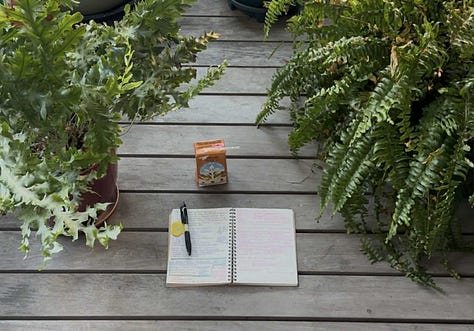
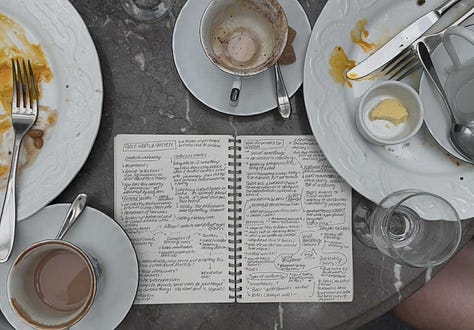
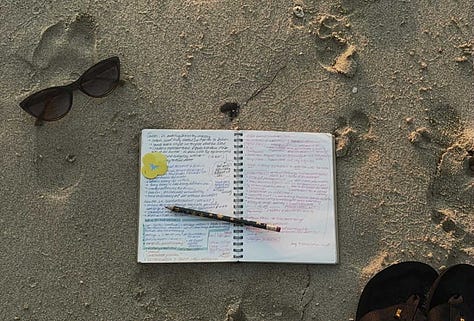
They all attribute this ritual to the iteration it inspires and the more tactile connection it offers to the craft. “I feel like the rhythm of the words gets mirrored in the movement of my hand and the speed of my blood. And it slows me down, which is a good thing,” says Mary Gordon, New York’s official state author.2
Pulitzer prize winning author Anna Quinden, in her book Write for Your Life, insists that handwriting is severely emotional. She describes the last moments she shared with her late father — how she found her father’s handwritten “Funeral” file, where he had written his own obituary to be published as written. “I clung to it when he was dead,” Quinden wrote.
Stationery shopping is not the same anymore
Style aside, the ritual of writing requires and exhaustive set of decisions. Choosing the paper, the weight of the pen, formatting… writing a letter to a pen pal is an act of love as much as it’s a gesture of effort.
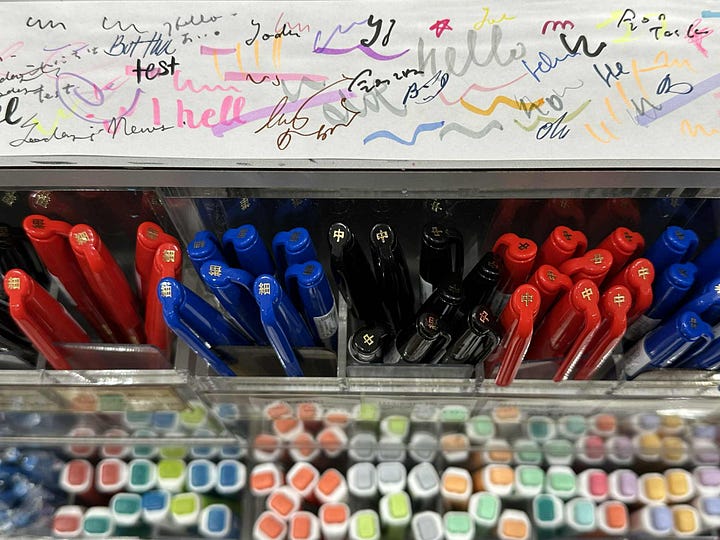
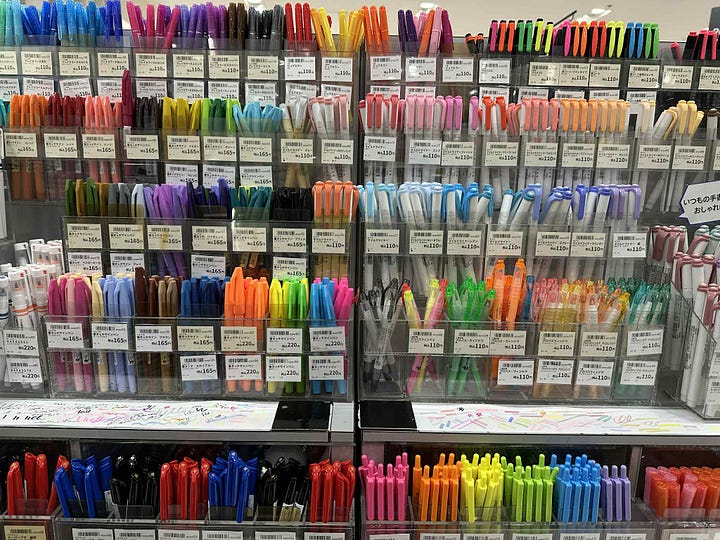
Every decision tells you a bit more about the state of the writer: creases on the page from pondering too intensely, oil stains from a mid-write snack, even awkward gaps between words from a lost train of thought.
Lesley Finn, a collage artist based in Connecticut, wrote this wonderful study on putting special pen to special paper:
“Even cheap and cheerful notepads made with Japanese paper seem to make the ink fly. And that joy of flight in some way catches on the fibers. Higher end papers, like Maruman’s Mnemosyne line, are impossibly tender beneath the hand, absorb ink like groundwater.”
— Lesley Finn, Collage Mind
To think that all this is lost to the homogenous SF Pro and blue bubbles (or green, we don’t discriminate here) we see on our phones. The experience of visiting a stationery store has never been the same since. Remember when personalized stationery was a status symbol? When we’d develop attachments to a specific brand of pen?
Writing by hand may slow us down, but it also frees us from distractions.
This is only the second draft of this post. So far I’ve made less dramatic changes here than I have for most other essays. It’s like that saying: do it right the first time!
We forget that the meditative process of writing helps correct our passing idiosyncrasies. In Chinese, the order of strokes that make up a single character matters, clearly defining a proper way to write, even if it isn’t immediately visible at first glance.
*** This is when my pen started running out of ink. How fitting, as I’m trying to wrap this post up. It’s as if I’m getting Substack’s dreaded “Near Email Limit” notice. ***
Writing by hand is a reminder that words carry weight.
Now to address the elephant in the room: isn’t voice diction even MORE high-tech than a keyboard? Well, yes. How else was I supposed to digitize my barely-legible script? Besides, the cringe-worthy experience of reading my writing out loud is incredibly humbling. Tasting my typos, I’ve discovered, feels like eating soap. (It’s no secret I’ve had a bit of trouble keeping typos out of my posts. One of you lovely readers gave me a hot j-school tip: read backwards, don’t read for comprehension.)
Writing this entry by hand made my own laziness my worst enemy. I dreaded the thought of rewriting the piece by hand, so I had to really outline my thoughts before I began scribbling. Maybe it’s time we reintroduce the friction of handwriting in our everyday lives, really feel the weight of our every word.
Absolutely NOTHING should be as easy as sending a tweet.
For those skeptical, here is my full handwritten draft:
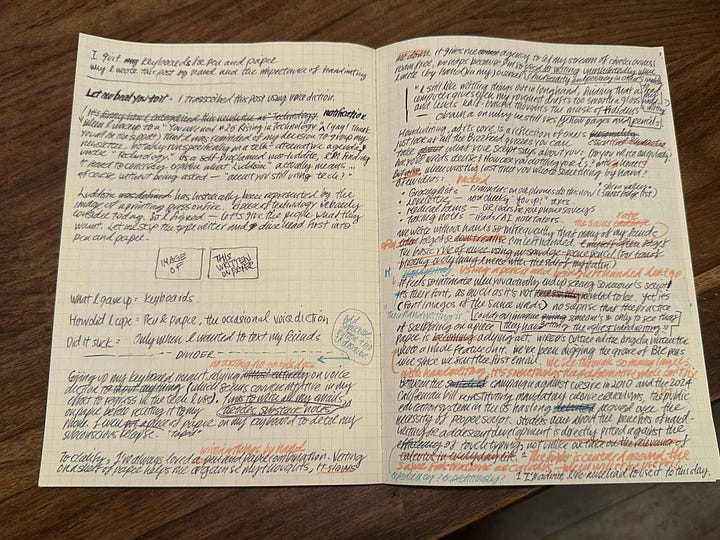
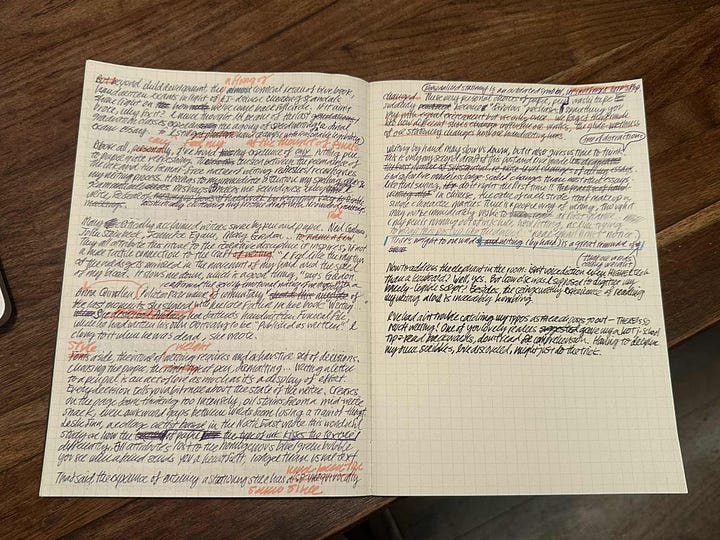
Hello friends! I recently enabled paid subscriptions to support some of my more rogue ventures in cyber celibacy (typewriters, building a printing press… more to come).
I also created a Snail Mail Membership, where (in true neo-luddite fashion) I’ll physically mail you this newsletter on a bi-monthly basis. For the first dozen snail mail members, I’ll handwrite your first letter <3
Thank you all for the support!
I didn’t know we had these either



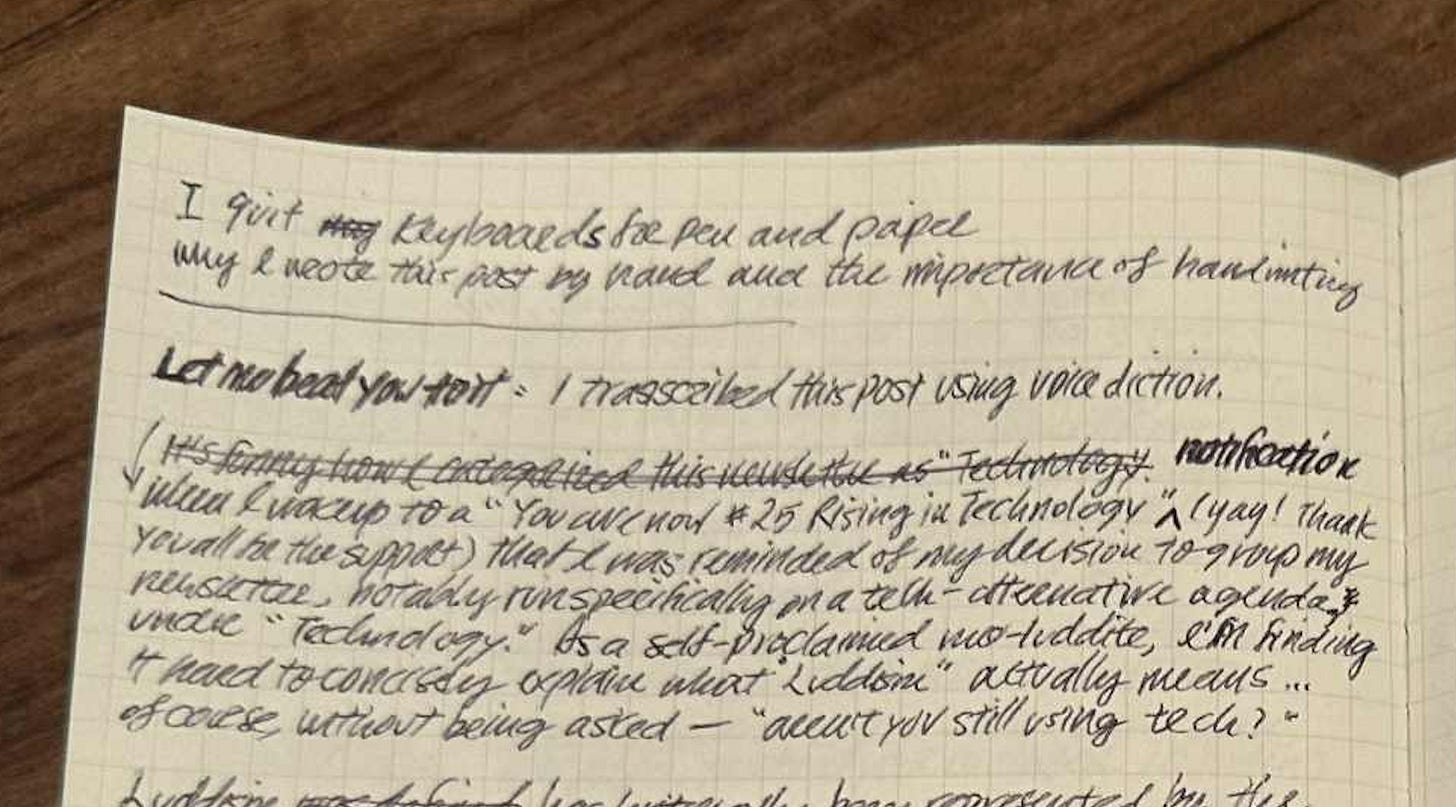

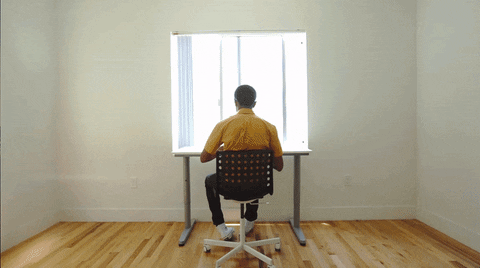
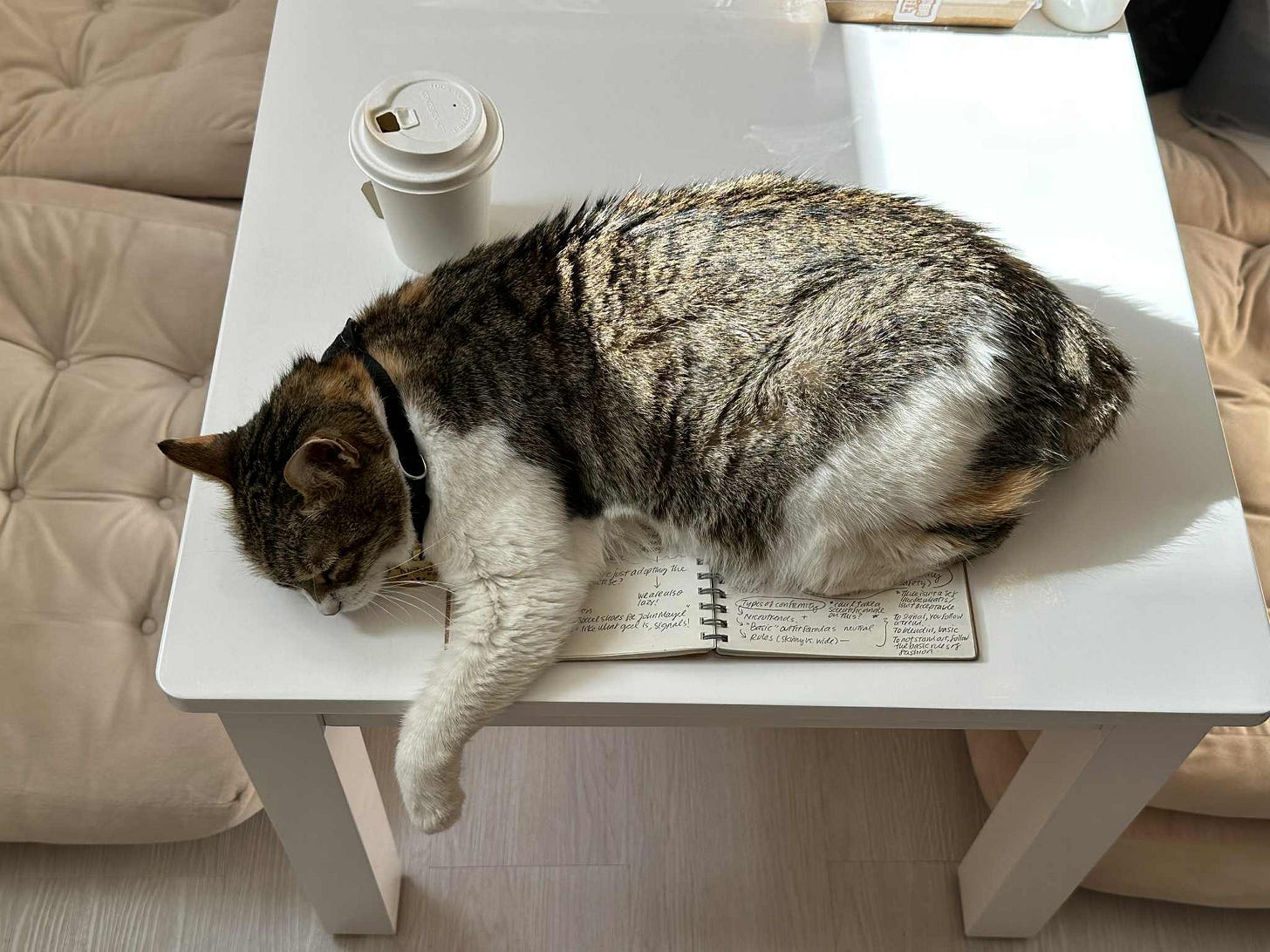


Love this. I agree that handwriting feels very intimate. Every time I see something written on paper by my late father, I feel like I'm somehow close to him, knowing that his hand was once there.
I loved reading this Tiffany. I've always written by hand in my journals, and I feel like I am simply not the same person if I'm not always scribbling. Leaving my journal at home feels like leaving part of my soul behind sometimes - even if I don't end up writing that day! However, I always struggled with writing “real” things on paper because of that friction. I always assumed that it was a problem, but reading this shifted my perspective in such a beautiful way. I can't wait to experiment!